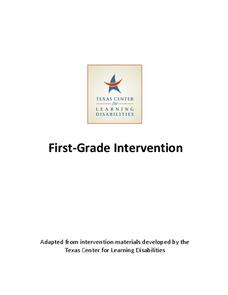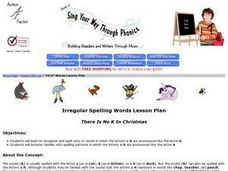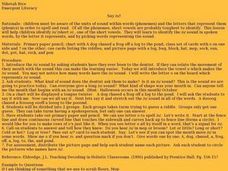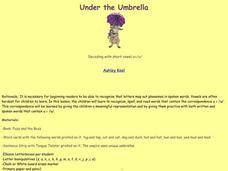Texas Center for Learning Disabilities
First-Grade Intervention
Learning how to read is a big challenge for young learners, but this series of lessons provides them with the extra support they need to succeed. With each lesson following the a clearly outlined format, children are introduced to new...
Houghton Mifflin Harcourt
Special Friends: English Language Development Lessons (Theme 9)
Enhance language proficiency with a Special Friends themed English language development unit. Each lesson follows a listen, speak, move, and/or look routine that is guaranteed to get your scholars discussing topics such as animal...
Curriculum Corner
Digraph Word Hunt
Support young learners with developing their spelling skills and ready fluency with this simple graphic organizer. Focusing on the four consonant digraphs /th/, /ch/, /sh/, and /wh/, students dig through their independent reading books...
Desire2Learn
Alliteration Worksheet
Learners love literary lyrics! Practice alliteration with an activity that encourages kids to find a line of alliteration for every letter of the alphabet. After they finish, they can create a line of their own alliteration and explain...
Have Fun Teaching
Blends Concentration
Practice blending initial sounds with a St. Patrick's Day-themed word sort! Scholars read 20 word cards, organize them by initial blends, and write their findings on a corresponding worksheet.
Meadows Center for Preventing Educational Risk, University of Texas at Austin
Lesson 17 - Adding Suffixes That Change Base Words' Finally to I
If it ends in a y, change the y to i when adding a suffix like -ness, -ly, or fy. The final lesson in the Word Recognition and Fluency series of 17 explains when to change the final letter in a base word to i before adding a suffix....
Curated OER
Ehhhh?
Are your kindergarten learners working with the letter e and the sounds that is makes? They'll practice writing a capital e, hear the /e/ sound in a funny tongue twister, and then identify when the teacher is saying a word that uses the...
Curated OER
Amazing As
Help young readers recognize the short vowel /a/ in written and spoken language. Through matching and listening activities, they discriminate the vowel sound /a/ from other phonemes. Learners associate the phoneme with its letter...
Curated OER
"Aaaaaa!!!!" It's Okay, Baby!!
Your kindergarten or first grade class works on recognizing the /a/ sound in spoken words. Use the fun tongue twister to help remember the target sound, and practice writing the letter a. Then have them write words that use this target...
Curated OER
"There Is No K In Christmas"
Do you hear a k in the word Christmas? It sounds like it, but it's really a ch that creates the same sound! Teach young learners this fun song, "There is No K in Christmas," and show them words that use ch to make the same /k/ sound.
Curated OER
Henry Howls
Let's learn the letter h! Elementary learners will hear the sound, learn a catchy tongue twister, and identify the sound in different words the teacher says. After some writing practice, read A House for Hermit Crab, by Eric Carle, to...
Curated OER
I Scream You Scream We All Scream for Ice Cream!
Use letter boxes and example words to help kids distinguish between the sounds for short vowel e and long vowel e. They are introduced to the vowel patterns that comprise long vowel sounds, with a particular emphasis on /ea/. They...
Curated OER
Say Aaaah
Using letter boxes and a series of activities, young learners will identify the /o/ sound. Give them the fun tongue twister before having them manipulate letters in the letter box, and then read In the Big Top. Can your learners find the...
Curated OER
Everybody Get Ready
Learners identify and spell words containing the short /e/ sound. They rehearse a fun tongue twister which contains words emphasizing the short /e/ sound. They then read Red Gets Fed as a class. Have your group clap every time they hear...
Curated OER
Itchy Ritchy
Itchy Ritchy can help your learners remember the /i/ sound! First teach young learners the fun tongue twister illustrating the target sound, and have them identify the target sound in other words. Use the reading Tim and the Top to...
Curated OER
Indiana Igloo
Your young charges practice identifying the /i/ sound in this lesson. The class looks at words on cards and identifies which word has the target sound. They continue their practice using Elkonin letterboxes to spell words with the /i/...
Curated OER
Astonishing "A"
Young learners gain phonemic awareness with this quick activity. First, point out what sound you’re focusing on today: /a/. Then spell basic words that use this sound, like fat, bat, cat, etc. As a culminating activity, the whole group...
Curated OER
Say /o/
Ollie the octopus is occupied! Use this tongue twister to help youngsters learn the /o/ sound. After practicing the target sound, learners should print the letter. When they are familiar with the letter and its sound, the group will...
Curated OER
Mmm, Mmm ... Good!
Help primary learners learn the /m/ sound. As they listen as the teacher introduces the "Secret Code" of language they will practice the /m/ sound by rubbing their tummies as if eating something good. They also practice hearing and...
Curated OER
Phonics: Decode and Write Words
Sounding out individual phonemes and blending them to make a word is usually one of the first tasks mastered when learning to read. Make master decoders out of your learners, they sound out a series of simple two and three-letter cvc...
Curated OER
Decode and Write Words with More Than One Syllable
Practice sounding out multi-syllable words with this scaffolded lesson plan. Learners decode words by segmenting them into phonemes and combining the sounds. Your lines are in bold here, but you can easily use this simply as an outline...
Curated OER
The Tug Says Uhh!
Kindergarteners and first graders discover the /u/ sound! After practicing making the sound with the funny tongue twister, youngsters use their Elkonin letterboxes to divide a set of words into their phonemes. Then pairs read Bud the Sub...
Curated OER
Under the Umbrella
The unicorn uses Uncle's underwear! Practice saying this tongue twister with your young learners to illustrated the /u/ sound. After comparing pairs of similar words (like cut and cat) and their sounds, learners will read Fuzz and the...
Curated OER
Open Up And Say Ahh
Who has a word that has an /o/? Teach kids this fun song (sung to the tune of "Skip to My Lou") to remember the /o/ sound and words that contain the target sound. Then have learners identify the sound in various words before reading In...
Other popular searches
- Beginning Letter Sounds
- Matching Letters to Sounds
- Matching Letters and Sounds
- Letters Sounds G
- Sounds and Letters
- Teaching Letters and Sounds
- Sounds of Letters
- Ph Letters and Sounds
- Learning Letters and Sounds
- Alphabet Letters and Sounds
- Creative Letters and Sounds
- Phonics Letters and Sounds

























